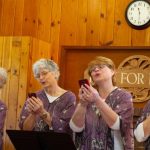by Kip Coerper, member of St. James’ Episcopal Church in Skaneateles
Photo via the Global Episcopal Mission Network.
Kip Coerper of Skaneateles and Dori Fulk of Horseheads recently traveled to Virginia Theological Seminary for the 2018 Annual Conference of GEMN, the Global Episcopal Missions Network, on behalf of the Episcopal Diocese of Central New York. Coerper reflects below on learnings from the conference.
Mission work is about making relationships. Accomplishing tasks is a wonderful byproduct of our “going out” and caring for God’s people. In going out we often have to cross boundaries—passports to a new country, language barriers, cultural differences, new food choices and more. In being missioners, we seek to reduce these barriers. God is ahead of us. Mission is God’s kingdom. In His kingdom we are called to love God’s people. Mission is the movement of God’s love toward His people, so we are placed in the midst of that movement and we have the opportunity to act on that purpose on behalf of God’s kingdom.
Mission is local and global, not either/or. For God calls us to “all nations”—to love and care for all people. No one person is less human than another. All humanity is God’s people; thus we are called to love everyone equally without care for their social position, religion, sexual preferences, living conditions, etc. God is love. We, as Christians, are created in His image, and thus we are called to act on that premise. Our baptismal covenant expresses this expectation very clearly (p. 305 in the Book of Common Prayer).
We are asked to “seek and serve Christ in ALL persons, loving your neighbor as yourself” and we are asked to “strive for justice and peace among ALL people, and respect the dignity of every human being.” Fundamentally, we are asked to connect with God’s people and to give our heart away.
When we go on mission, we are not going on a trip. A trip implies a destination, and a beginning and an end. It also is usually about doing things that are pleasing to us, things that we want to do. Being on mission is focused on the other and on building up God’s kingdom, and on creating relationships across space and time that spread and unite the presence of God’s kingdom. It is an opportunity to meet God, who is already there.
There are 5 premises when we go on mission:
- Show up and be prepared to cross boundaries.
- Pay attention. Who are the people we are with? How do they live life? Enter into their way of living and being.
- Be in community: with the entity (church) that sends you, with your team, and with the people with whom we are going to be on mission.
- Tell our story. Share our heart, who we are, deepen our relationship with each other.
- Do the work.
We are all here because of a love story—God’s love for His people. Being on mission is living into that story and acting on it—to love others as Jesus loves us. In the sharing of our story and listening to God’s people, healing can occur. God provides the glue as we share with each other to let us and let them hear things that are revealed about our personal and spiritual journey. “To love another person is to see the face of God.” (Victor Hugo).
As Christians, we are a global community. We see all people as brothers and sisters in Christ. We are called to reach across boundaries. Mission is about being sent: being sent to create relationships across these boundaries. We are sent on God’s mission of reconciliation with Him and with one another. Love is the foundation. We see God in each other.
The Rev. Dr. Robert Heaney (Director of the Center for Anglican Communion Studies and Associate Professor of Christian Mission at Virginia Theological Seminary) finished the conference by sharing with us that if we are to go on mission, we need to be cognizant of four things:
- The first challenge is to have a clear theological understanding of why we go on mission. We should be able to complete the sentence, “Mission begins with God because…”
- What practical measures will we take to have cultural accountability?
- Be aware of the gap between our rhetoric and reality. Be clear about our intentions.
- The Anglican Communion is a gift of diversity. Thus, if we are going on mission journeys within the Communion, we are immediately opened to inter-fellowship and cross-cultural engagement.
Dr. Heaney recommended several books for missioners:
- World-Shaped Mission: Reimagining Mission Today by Janice Price
- Short-Term Mission: An Ethnography of Christian Travel Narrative and Experience by Brian M. Howell
- Rescuing the Gospel from the Cowboys: A Native American Expression of the Jesus Way by Richard Twiss
- Finding God in Each Other Amidst the Hate by Robert Heaney (forthcoming, 2018)


